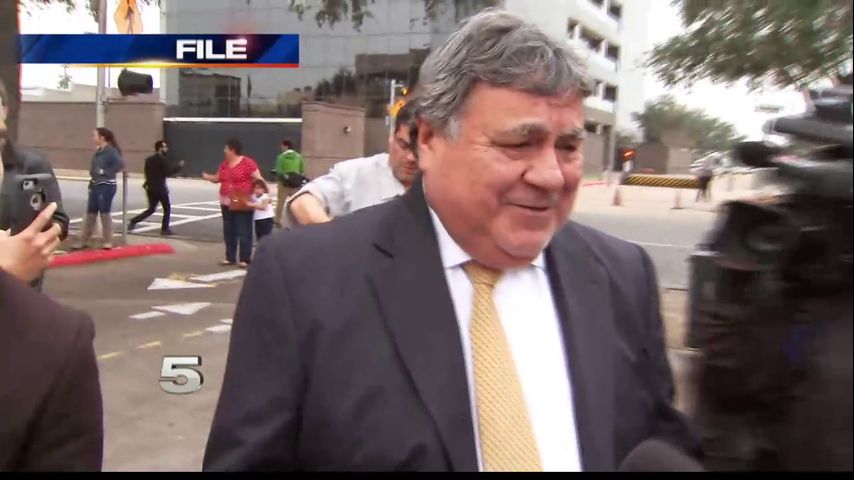5th Circuit Court of Appeals upholds former state District Judge Rudy Delgado's conviction on bribery charges
The 5th U.S. Circuit Court of Appeals upheld the conviction of former state District Judge Rudy Delgado on Tuesday.
A jury convicted Delgado on bribery, obstruction of justice and federal Travel Act charges after a six-day trial in July 2019. U.S. District Judge Alfred H. Bennett sentenced Delgado to five years in prison.
Delgado appealed, claiming his conviction wasn’t supported by the evidence. He also challenged the five-year prison sentence. The Fifth Circuit, however, rejected Delgado’s arguments.
“We are pleased and respect the decision of the court,” said Angela Dodge, a spokeswoman for the U.S. Attorney’s Office for the Southern District of Texas, which prosecuted the case.
Attorney Michael C. Gross, who represented Delgado on appeal, declined to comment.
The case against Rodolfo “Rudy” Delgado, 67, of Edinburg started with a tip about Noe Perez, a local attorney, who claimed he could bribe a judge.
Perez became a federal informant. The FBI recorded conversations between Perez and Delgado, who accepted cash during conversations about pending cases.
Prosecutors showed the jury videos of Delgado accepting cash, including an envelope stuffed with $5,500. In other instances, Perez bribed Delgado by paying inflated prices for mesquite firewood.
The jury deliberated for roughly nine hours before reaching a verdict.
Bennett, the federal judge, sentenced Delgado to five years in prison.
“What you stand accused of tears at the very fabric of our society,” Bennett said at sentencing. “It gives air and weight to people who look upon courts with suspicion — that it does matter who you know, that it does matter the size of your bank account, that justice can be purchased.”
Delgado apologized but didn’t explicitly admit to accepting bribes.
“I was a good person. I was a good judge,” Delgado said. “I succumbed. And I will pay the price for that.”
Seven months after sentencing, Delgado filed a full-throated appeal, challenging his conviction and how the judge calculated his prison sentence.
Delgado argued that prosecutors never proved he had an explicit agreement with Perez to accept cash in exchange for courtroom favors.
“In making this argument, Delgado mainly points to portions of Perez’s testimony on cross-examination where Perez purportedly denies that he bribed Delgado, denies there was a quid pro quo, and characterizes the wood payments as legitimate purchases of wood that were merely accompanied by Perez’s independent ‘hope’ that Delgado would rule favorably for him,” according to the Fifth Circuit decision. “It is true that, to some extent, Perez was an inconsistent witness and that he sometimes minimized culpability during his testimony. But the jury was in a position to assess the credibility of Perez’s conflicting statements in light of the totality of the evidence and was free to conclude that Delgado agreed to accept money from Perez with the intent to be influenced in his decision to secure favorable outcomes for Perez’s clients.”
Delgado also challenged how the judge calculated the “benefit received” in exchange for the bribes.
The dispute involved how to value personal recognizance bonds.
A personal recognizance bond allows a defendant to be released from jail without paying a bondsman or depositing any money. If the defendant fails to appear in court, the defendant is required to pay the full amount of the bond.
Prosecutors said Delgado approved personal recognizance bonds in exchange for bribes of approximately $260.
Delgado’s sentence was determined in part by the value of the bonds. Delgado, though, argued the bonds actually had no cash value.
“In the case at bar, each PR bond was set at $5,000.00, but each required only a signature and promise to appear — no cash for the bond,” Delgado’s attorney wrote in his appeal. “The value of the benefit received, therefore, is a signature and promise to appear which is not $5,000.00 per bond and is not the amounts of the alleged bribes.”
The Fifth Circuit disagreed.
“At its core, the ‘value’ someone receives from a PR bond is intertwined with a liberty interest that is hard to definitively quantify,” according to the Fifth Circuit decision. “We do not think it was error—let alone clear error—for the district court to value the bonds at the amount Perez’s clients were willing to risk forfeiting in order to secure the bonds. We therefore reject Delgado’s challenge to his sentence.”
Delgado, who suffers from heart and liver problems, is serving his sentence at Federal Medical Center Fort Worth. He is tentatively scheduled for release in February 2024.





